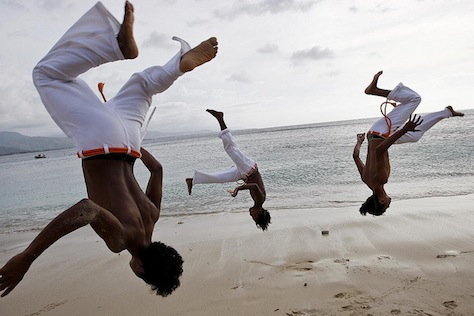No matter who wins Indonesia’s presidential election on July 9, one of the most central foreign policy issues for its winner, will be relations with tiny Timor-Leste, the state that occupies the eastern half of the island of Timor and that broke from Indonesia formally in 2002 after three decades of unrest.![]()
![]()
Timor-Leste is just 12 years out from its hard-won independence from Jakarta, following centuries of benign Portuguese colonial neglect, a three-year not-so-benign Japanese interregnum during World War II and 27 years of terror perpetuated largely by the Indonesia military, some of the worst in the immediate aftermath of the United Nations-administered August 1999 independence referendum.
No matter who wins tomorrow’s presidential election in Indonesia, relations with Dili, the East Timorese capital, will undoubtedly be just as important for Indonesia’s next president as they were for outgoing president Susilo Bambang Yudhoyono (‘SBY’), who has largely improved the relationship between the two countries.
* * * * *
RELATED: Will Prabowo Subianto become Indonesia’s next president?
* * * * *
Megawati Sukarnoputri, when she was president between 2001 and 2004, traveled to Dili to mark both Timorese independence and the swearing-in of its first national president.
But it’s been under Yudhoyono’s watch that Indonesia truly turned the chapter from post-colonial occupier to economic partner and increasingly, friendly neighbor. Yudhoyono went to Dili for the first time within six months of taking office, laying a wreath to commemorate the deaths in the 1991 Santa Cruz massacre, and he attended a 2012 celebration marking the 10th anniversary of Timorese independence. Under SBY, Indonesia has become, by far, Timor-Leste’s largest trading partner.
For the first time, in 2012, Australian prime minister Julia Gillard hosted trilateral talks alongside Yudhoyono and Xanana Gusmão, a former resistance leader, Timor-Leste’s first post-independence president and its prime minister since 2007.
With Gusmão planning to step down later this year after seven years leading Timor-Leste’s government, it will be especially important for the next Timorese prime minister and the next Indonesian president to develop the same diplomatic relationship that Yudhoyono and Gusmão share today.
That may prove difficult if Indonesians elect Prabowo Subianto, the leader of the nationalist Gerindra (Partai Gerakan Indonesia Raya, the Great Indonesia Movement Party), a former Suharto-era general and former leader of Indonesia’s special forces. Dismissed in 1998 upon Suharto’s ouster and self-exiled to Jordan, Prabowo returned as a businessman and now, as a politician, and he’s climbed back from a double-digit deficit, with essentially even odds to defeat Jakarta governor Joko Widodo (‘Jokowi’) in tomorrow’s election.
Yudhoyono also came to democratic politics from the Indonesian military, where he developed a reputation as a particularly thoughtful general. Like Prabowo, Yudhoyono has been sullied by his leadership role in the Indonesian National Armed Forces (TNI, formerly ABRI) and its misconduct in East Timor from the 1970s through the 1990s. But Prabowo has been tied to specific abuses in East Timor, including a troubling 1983 massacre in a village called Kraras:
But in recent months allegations of human rights violations involving Prabowo have intensified. Jemma Purdey voiced the opinion that as an soldier Prabowo had four tours to East Timor and led units that were “involved in some very extreme instances of violence”. Many believe that Prabowo also played a role in the 1983 massacre in Kraras, known as the village of widows, which killed many East Timorese. Prabowo protested in the strongest terms and refuted the scurrilous allegations in a letter to the editor of The Jakarta Post on Dec. 27, 2013.
Despite Prabowo’s protestations of innocence, those questions will continue to haunt any Prabowo administration, as will more well-documented accusations of human rights abuses in 1998, when Prabowo is said to have kidnapped and possibly tortured pro-democracy activists, are among the reasons the United States denied him a tourist visa in 2000. Continue reading What Indonesia’s election means for Timor-Leste
